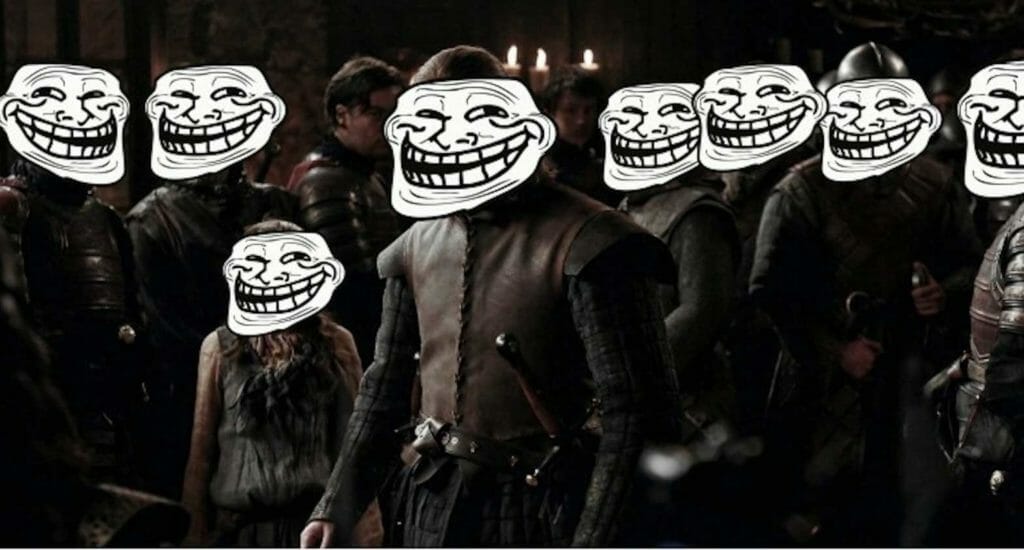The Game of Trolls

As early as 2005, the North Atlantic Treaty Organization (NATO) recognized the rise of troll farms created to sow disinformation, concealed under the subtle name of a Public Relations agency. This is one of the findings Paul Bernal discloses in his book titled The Internet, Warts and All: Free Speech, Privacy and Truth, published by Cambridge University Press in 2018.
What’s more, Chancellor Angela Merkel expressed her concerns to the German Parliament when she said: “Today we have fake sites, bots, trolls…” That was in 2016, and now we know that the perfect mix of the three (fake sites, bots, trolls) can spell disinformation and disinformation is one ugly monster of the new millennium that can instantly kill democracy.
If democracy is a government of informed citizens that prospers under the free exchange of ideas anchored on facts, trolling does the opposite by targeting the uninformed and the vulnerable, confusing them, and muddling their ability to make right choices. With trolling, the basis of elections is no longer the facts or the truth, but perceptions. In the mind of Imelda Marcos (in the 2019 documentary The Kingmaker), “perception is real, truth is not.” In this sense, trolling is a real danger to democracy.
The Philippines, where there is widespread usage of social media and limited resources to check the accuracy of “infodemic,” is also the place of notorious politicians who would do anything and everything to win an election by spending tons of money of suspicious origin. I am speaking of the fact that trolling and troll farms are being utilized strategically to drastically influence the voter’s choice and ultimately win an election.
Face to face with such reality we, voters, are left with a series of questions: Who among the candidates has the guts and the means to employ trolls to win an election? Is he the one that carries the heaviest baggage of historical misdeeds and would want to erase all the ugly shadows of the past (Martial Law brutalities, plunder, and all)? He who wants to project a persona better than who he truly is?
With this in mind, we recall those ten days of January of 2022. On January 16, 2022, avid supporters of presidential frontrunner Ferdinand “Bongbong” Marcos Jr. (BMM) organized a Twitter party because the hashtag #LabanMarcos was trending. One of the accounts was @UTLoyalist, which was created in November 2021.
This extraordinary trending confirmed a special report of the news website Rappler about the massive build-up of pro-Marcos Twitter accounts, a report based on a study conducted by the Philippine Media Monitoring Laboratory to track behaviors on social media platforms in relation to the 2022 elections.
The report also says that since September 2021, the now-massive Marcos network has been making attempts to take over Twitter with newly-created and freshly-revived accounts. For what purpose? The report says that the info operations on Twitter used these accounts to promote the BBM candidacy in a ginormous way and ultimately win in the May 2022 elections.
But is it wrong? Do such social media operations consist of a moral or illegal violation of policies against platform manipulation and spam? Yes, Twitter Inc. says so. And, because it believes that what those accounts were doing were forms of platform manipulations, Twitter on January 21 suspended more than 300 accounts related to the promotion of the BBM candidacy. Three days later, BBM denied – as always – having a troll farm, claiming that the social media support he is getting is “organic.” Do you believe him?
On January 25, a once-trusted ally of President Duterte, Ernesto Pernia, publicly aired his opinion that the only reason BBM is leading the presidential surveys is that his camp indeed employs “huge troll farms.” I remember that, as National Economic and Development Authority (NEDA) head from 2016 to 2020, Pernia is used to reading trends, statistics, and political-numbers behavior.
Do we forget the shameful event in September 2020 when Facebook tracked down two networks, one in the Philippines and the other one in China, both of them shut down for engaging in “coordinated inauthentic behavior” or CIB, which was linked to the 2022 elections?
The first one was a domestic cluster of over 100 fake social media accounts traced to the police and military units in the Philippines, and the second one was a network of fake Facebook accounts traced to trolls from China’s Fujian province. If trolling is a verifiable fact, who now among the candidates is capable of doing the same?
When The New York Times, the BBC News, and The Los Angeles Times have reported that countless fake social media accounts and trolls that peddled lies were “Made in the Philippines” and the evil side of the web has already taken the center stage in Philippine politics. It hurts because it is true.
So, we end with a final question: What moral authority will a national leader have, he who cheats, lies, and uses troll farms to win an election?
Jose Mario Bautista Maximiano (facebook.com/josemario.maximiano) is a Catholic theologian, educator, and the author of the 3-volume book series on 500 Years of Christianity in the Philippines (Claretian, 2020, 2021, 2022).

